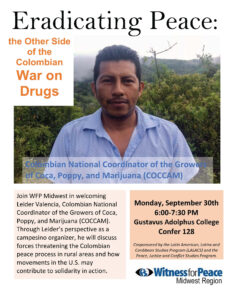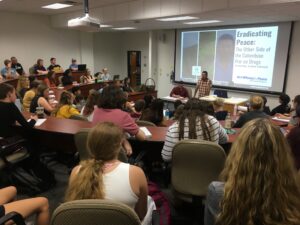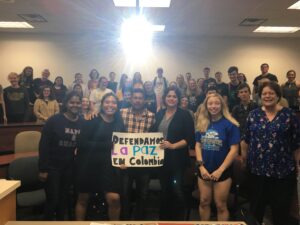 At this event, representatives from Witness for Peace, a human rights organization, gave a presentation on human rights violations in Colombia. Leider Valencia, a representative from Coordinadora Nacional de Cultivadores de Coca, Amapola, y Marihuana (COCCAM), led the presentation. As a small farm owner in rural Colombia, he, along with many of his fellow farmers, were forced to cultivate and sell coca plants in order to survive a state of divestment and abandonment by the national government. However, with the 2016 Havana Peace Accords between the Colombian government and FARC (Fuerzas Armadas Revolucionarias de Colombia), these farmers face a new policy of crop substitution.
At this event, representatives from Witness for Peace, a human rights organization, gave a presentation on human rights violations in Colombia. Leider Valencia, a representative from Coordinadora Nacional de Cultivadores de Coca, Amapola, y Marihuana (COCCAM), led the presentation. As a small farm owner in rural Colombia, he, along with many of his fellow farmers, were forced to cultivate and sell coca plants in order to survive a state of divestment and abandonment by the national government. However, with the 2016 Havana Peace Accords between the Colombian government and FARC (Fuerzas Armadas Revolucionarias de Colombia), these farmers face a new policy of crop substitution.
The policy was originally supposed to include the uprooting of all coca plants, the offering of a legal alternative crop, and the offering of suitable services to rural areas so that farmers can stay on their feet throughout this substitution process. However, the policy has manifested on nothing less than a military campaign on its citizens. The government uses violent means and extreme methods of eradication to get rid of the coca, but the farmers do not receive the alternative crops and the social programmes that they need in return. As of today, Colombia has the highest level of internally displaced people, as well as the highest rate of union leaders killed in the world. Colombian citizens resist through demonstrations and community protection, among other things, but they need the world to recognize their struggle and offer support, which is why Lieder is traveling throughout the U.S. and telling people about his experience.
 The U.S.’s involvement in Colombia’s instability is very striking. Our government gives Colombia hundreds of millions of dollars in aid, and that money is being used for military campaigns and assassinations. None of it goes to the people who really need it — poverty-stricken citizens in the rural areas. How can we give out such a vast sum of money and not pay attention to where it goes? Not only should the government, the institution who decides to hand out the money, be more conscious about where the money is going, but so should American citizens. That money is taxpayer dollars; we should pay more attention to where it goes because wherever our money goes, our influence follows. Money is the ultimate connector of human society, and it weaves our responsibility and influence into the lives of others, even if they are a continent away. This just gives U.S. citizens another reason to participate in political life. Because we are a superpower, our choices have more effect on people around the world, therefore we have a larger responsibility to pay attention to the effects of those choices.
The U.S.’s involvement in Colombia’s instability is very striking. Our government gives Colombia hundreds of millions of dollars in aid, and that money is being used for military campaigns and assassinations. None of it goes to the people who really need it — poverty-stricken citizens in the rural areas. How can we give out such a vast sum of money and not pay attention to where it goes? Not only should the government, the institution who decides to hand out the money, be more conscious about where the money is going, but so should American citizens. That money is taxpayer dollars; we should pay more attention to where it goes because wherever our money goes, our influence follows. Money is the ultimate connector of human society, and it weaves our responsibility and influence into the lives of others, even if they are a continent away. This just gives U.S. citizens another reason to participate in political life. Because we are a superpower, our choices have more effect on people around the world, therefore we have a larger responsibility to pay attention to the effects of those choices.
However, it is difficult to pay attention to the situation in Colombia and the U.S.’s influence there when American citizens hear little about it in the news, and that is great cause for concern. Since the media doesn’t talk about it, U.S. citizens don’t even realize there is a situation that needs their attention. This is a reflection of the power of the media in our society and how it influences our concepts of what matters are important, distracting us from important issues like the suffering of thousands of people in rural Colombia. The easily available modern news media certainly has its advantages, but it is important to remember just how much influence it has over how we view the world. Because we can’t see everything that happens in the world first hand, we must rely on media, so it is up to us to remember that we are seeing the world through the lens of media and to reflect on how that may affect our perception of what is happening.
Grace Worwa ’22
English, Political Science and Spanish major

Leave a Reply